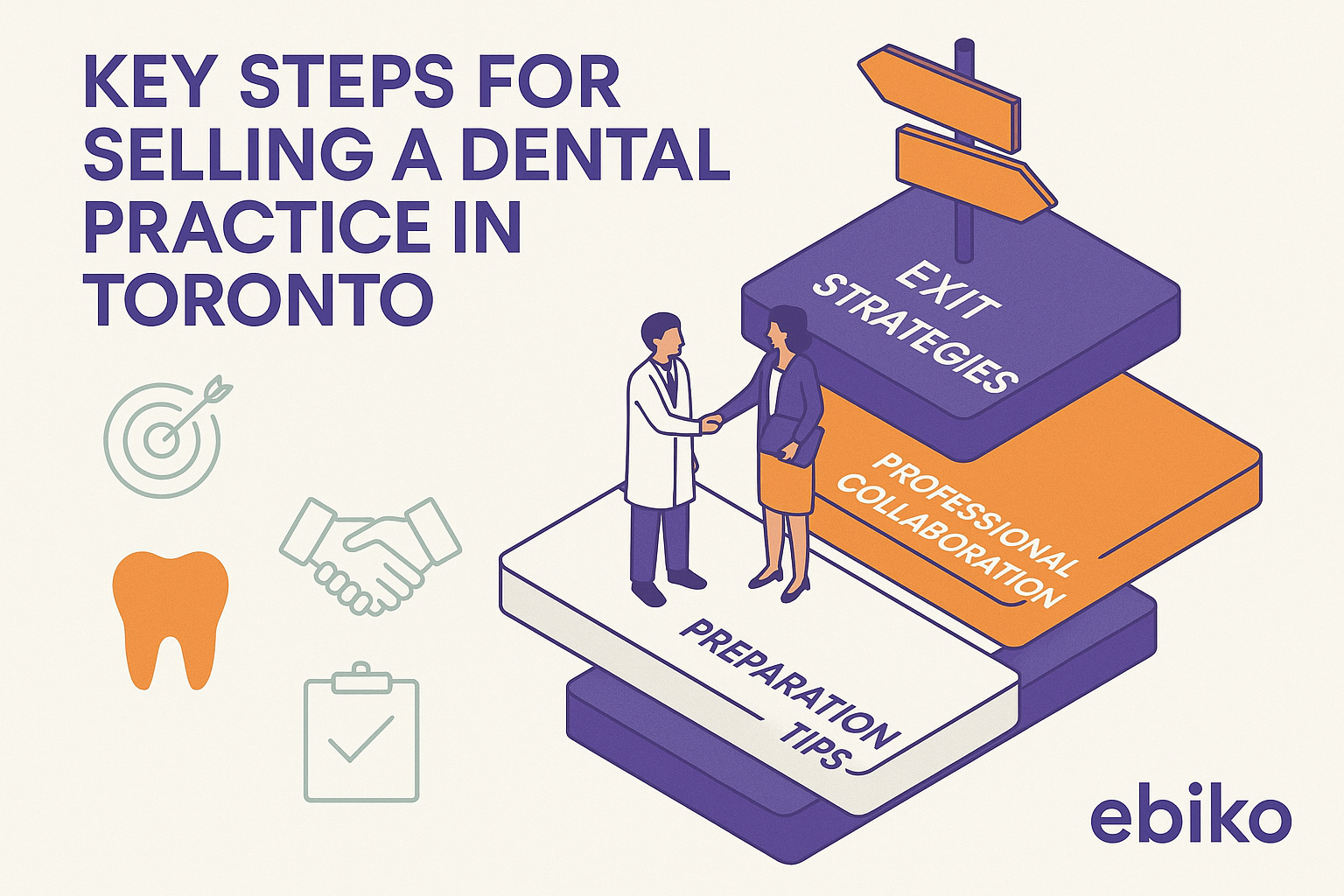Essential Steps for Selling Your Dental Practice in Toronto
Successfully selling your dental practice in Toronto or the Greater Toronto Area (GTA) requires thoughtful planning, legal support, and attention to operational details. Whether you’re retiring or pursuing another opportunity, the decisions made during this critical period have long-term impact on finances, staff, and patients. This detailed guide outlines the essential steps for a seamless transition while maximizing the value of your practice.
1. Create Your Exit Strategy

A well-built exit strategy lays the foundation for selling your practice on favourable terms. Starting the planning process early—ideally 18 to 24 months ahead—offers flexibility to adjust operations, attract buyers, and optimize value. Critical components include:
- Organizational Readiness: Streamline administrative workflows, update patient files, and ensure clinical compliance. A tidy, well-documented practice makes a stronger impression.
- Mentorship Opportunity: Guiding prospective buyers helps them understand the practice ethos, operations, and patient base, which can ease post-sale retention and ensure continuity.
2. Collaborate with Professionals

Navigating a dental sale is not a DIY process. Utilize a network of qualified professionals familiar with Canadian dental practice regulations to protect your transaction and ensure compliance:
- Dental Practice Valuator: Get a true market assessment from an expert who specializes in dental businesses to determine the fair selling price.
- Dental Lawyer: Legal documentation must meet Ontario's dental practice law. A lawyer ensures clarity on restraint clauses, patient custody, and staff liabilities.
- Dental Accountant: Proper accounting support helps avoid tax pitfalls, contributes to due diligence, and forecasts post-sale financial status.
- Dental Broker: Good practice brokers match sellers with targeted buyers while maintaining confidentiality and controlling listing exposure.
3. Prepare Your Practice

A visually and functionally appealing workspace can make or break the deal. Buyers want turnkey operations, not renovation projects. Focus on:
- Equipment Audit: Evaluate and update old units. Consider upgrading with EBIKO Dental’s quality lubrication and maintenance products to show up-to-date operability.
- Patient Systems: A clean recall management system and digital appointment booking record higher patient engagement and lower attrition risk post-sale.
4. Documentation and Inventory

Smart buyers will scrutinize your paperwork. Preparedness here saves time and instills buyer confidence:
- Financial Statements: Full visibility of revenue, expenses, and income trends over at least 3 years.
- Patient Metrics: Disclosure of active patients, appointment volumes, and retention statistics.
- Equipment Lists: Inventory details including age, model, warranties, and maintenance records. A well-maintained operatory equipped with EBIKO Dental’s high-speed handpieces or suction system cleaners adds operational appeal.
5. Establish a Communication Plan

Transparent and timely communication minimizes disruption. Structure your announcements wisely to manage reactions and maintain trust:
- Internal Communication: Notify staff early in the process and reassure them about transition expectations—many buyers prefer continuity in workforce.
- Patient Notification: Notify patients post-sale, once the new dentist is onboarded. Highlight the dedication to ongoing quality care. A personalized letter or email campaign can aid retention.
6. Legal Considerations

Legal missteps can delay or jeopardize the sale. Work with a dental transition lawyer to ensure your contract meets provincial regulations. Important areas include:
- Patient Records: Respect PHIPA regulations on privacy, and clarify who retains record custody.
- Equipment Inclusion: Specify included items and warranty flows post-sale.
- Restrictive Covenants: Define limitations on future practice (e.g., geographic radius) if applicable.
7. Assess Your Financial Position

Examine your financial outlook comprehensively—debts, liabilities, receivables, and planned retirement income. Also:
- Notify Your Insurance Providers: Inform your malpractice carrier and other insurers to begin disengagement or liability transitions.
- Cash Flow Preparation: Ensure you maintain operational funds until closeout to stabilize cash flow and payroll.
8. Tax Implications

Proper tax handling can significantly affect your sale profitability. Work alongside your accountant to secure capital gains advantages such as the Lifetime Capital Gains Exemption (LCGE) available for qualified small business shares in Canada.
- Asset vs Share Sale: Each offers different taxation models, affecting proceeds and liability transfers.
- CRA Compliance: Ensure all records align with Canada Revenue Agency expectations to avoid penalties or audit exposure.
Resource Integration
To make your practice more sale-ready, streamline daily operations with reliable dental supplies. EBIKO Dental supports practices across Canada by offering durable, high-performing products ideal for clinics preparing for ownership transition, including:
- Dental handpiece lubricants for extending device life
- Instrument and surface cleaners for procedural readiness
- Disposable supplies that maintain inventory freshness
Visit ebiko.ca to explore full categories that match the needs of transitioning practices.

